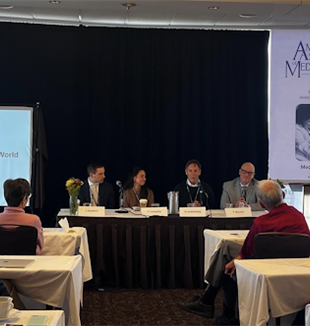
Educating in the Post-Pandemic Medical World
Jacob witnesses to the fact that in order to educate others, we first need to educate our own hearts.What sustains me in my work as a physician?
When this question was posed as the theme of the 2023 American Association of Medicine and the Person conference (also known as the MedConference), I desired to answer it for myself. I soon realized that, through the joys and challenges of my journey in medicine, my educators and mentors have frequently sustained me by being constant witnesses to the beauty of the medical profession when it is lived as a vocation. With this judgment in mind, I arranged and moderated a panel of speakers at the conference, hoping to shed light on the richness of the teacher-student relationship and to illuminate ways to revive and reinvigorate the current medical education system. What happened, however, was much more than I could have envisioned
The panel featured three people who I now call my friends: Tod, an internal medicine physician from Minnesota; David, a family physician from Maine; and Caroline, a medical student and future obstetrician-gynecologist from Florida. Though they brought with them very different backgrounds, skill sets, and stories, each shared a passion for education and a wealth of raw humanity that would show me a completely new way of looking at my questions. They told stories of educators who called them to the heights of what life offered, from an elementary school teacher who planted the early seeds for Tod’s eventual love of poetry or a colleague who drew David out of self-centeredness and into the present need of a patient. Caroline spoke with enthusiasm of her discovery of Enzo Piccinini, a deceased Italian surgeon whose passion and gusto for medicine awakened her in a time of crisis when she was studying for boards. After that moment, when she would face discouragement or uncertainty, she would turn again to a YouTube witness by Enzo, allowing his witness to re-invite her to the greatness that she is called to.
To combat the disillusionment that eventually befalls many medical students, they called not for institutional upheaval or reform but for belonging to a community and remembering your work as response to a vocation. As an antidote to the drudgery and monotony we face at times in our work, Tod stressed the value of great literature which shows us the intricacy, glory, and tragedy of humanity that we encounter on a daily basis. He shared examples of Dante, Robert Frost, Shakespeare, and others, eventually quipping, “I meet King Lear at least five times a week in the clinic.”
In the face of learner disengagement with increasing use of virtual learning platforms, they advocated not to throw away our computers but to use technology as a tool to connect when we otherwise could not. Most importantly, however, they emphasized the need to live with each other in the flesh by sharing meals and other moments together. As Caroline says to her friends, “come be with me…if I need this, I trust that you need it too.”
To close the session, I asked the speakers what they would say to a student considering a career in medicine but hesitant to accept the necessary sacrifices entailed. Caroline recalled a favorite quote of Enzo, who often said, “I did everything for happiness.” We all seek happiness and will only find it if we sacrifice for something greater than ourselves. David told how, when inviting students to come work with him, he tells them simply to “come and see”, inviting them to live in the community where their patients live, meeting them in the ordinariness of life. Tod shared four words – “dignity, calling, suffering, and grace” – that highlight the elements of embracing one’s call in life; “if you know your dignity and respond to your calling, you can move forward, embracing the suffering you will endure through the grace given to you by God.”
Medical education needs a revival. My friends taught me that this revival must happen not in medical schools but in each of us. We can clamor ceaselessly for better work hours, better pay, and better educational structures, but the answer to our human longing and restlessness will not be found there. We need to be more human. We need Shakespeare, Dante, and YouTube interviews with dead physicians. We need to invite our friends and colleagues into the ordinariness of our homes and dinner tables. We need each other, and we need witnesses to follow. To educate others, we first need to educate our own hearts.
Jacob, Rochester, MN